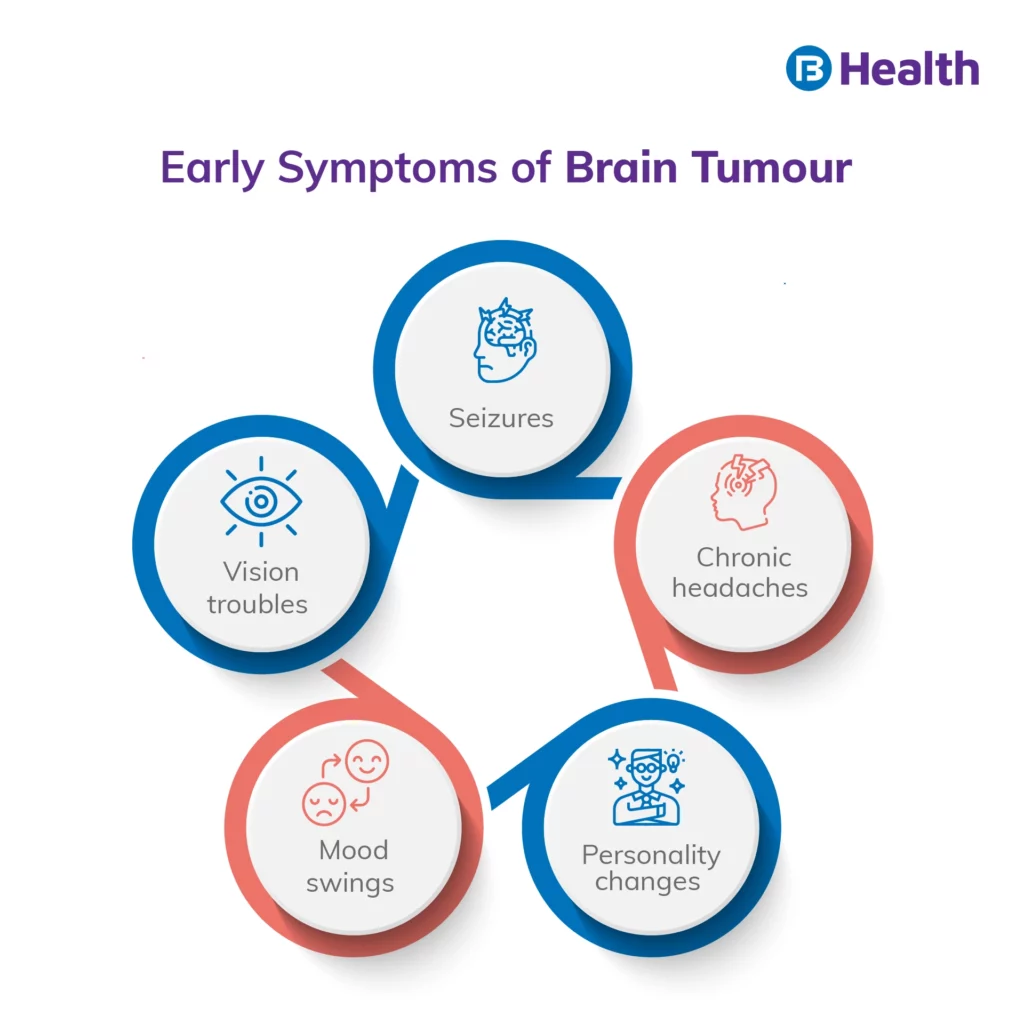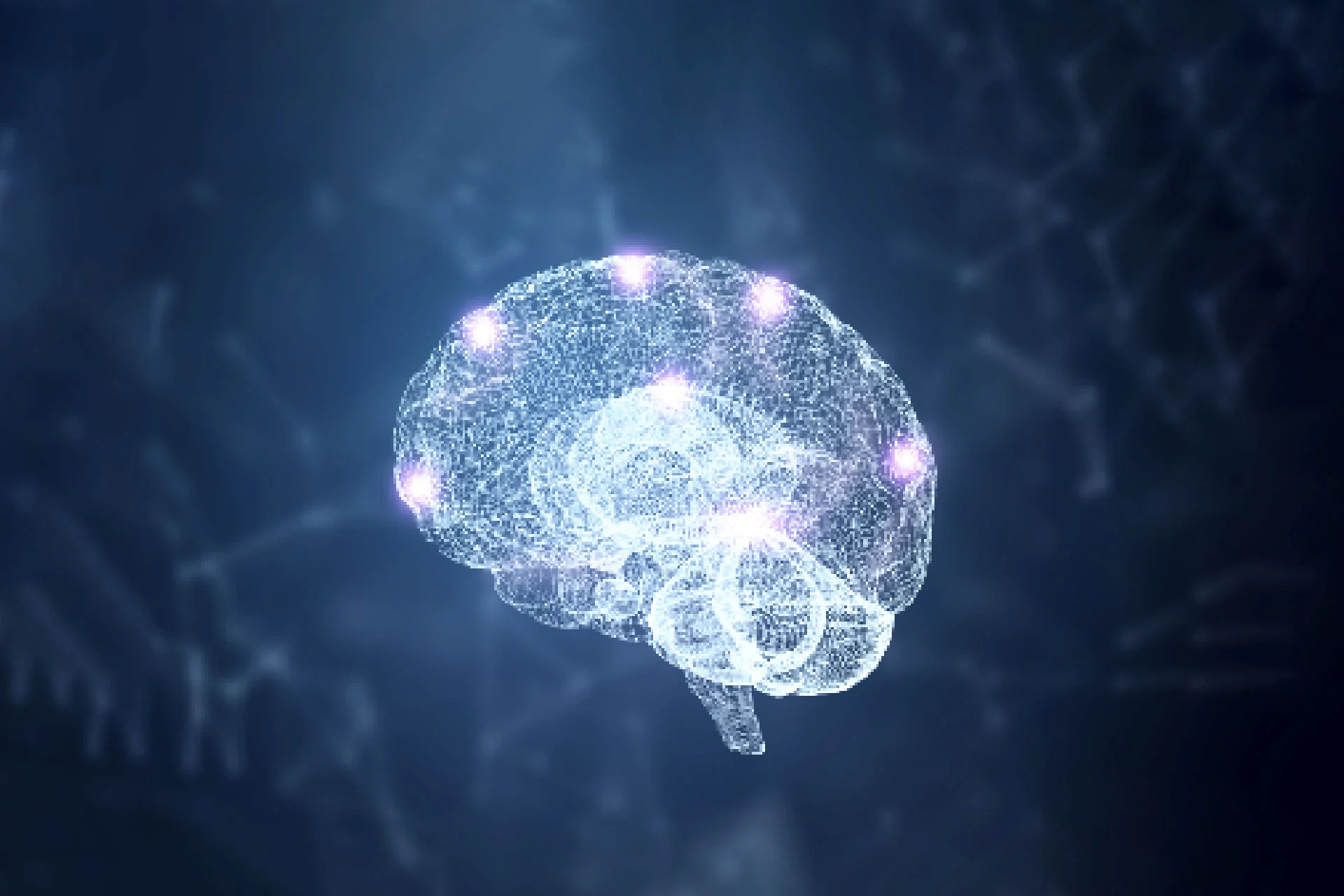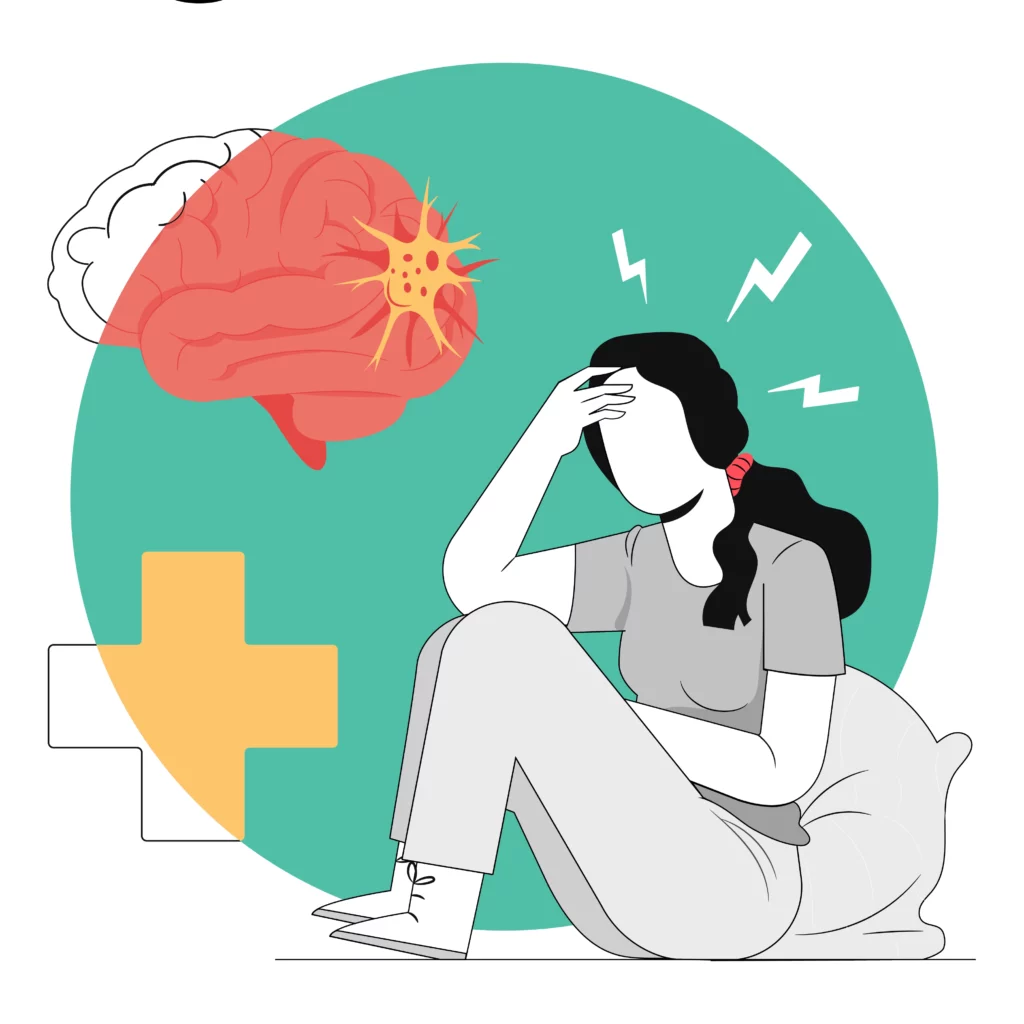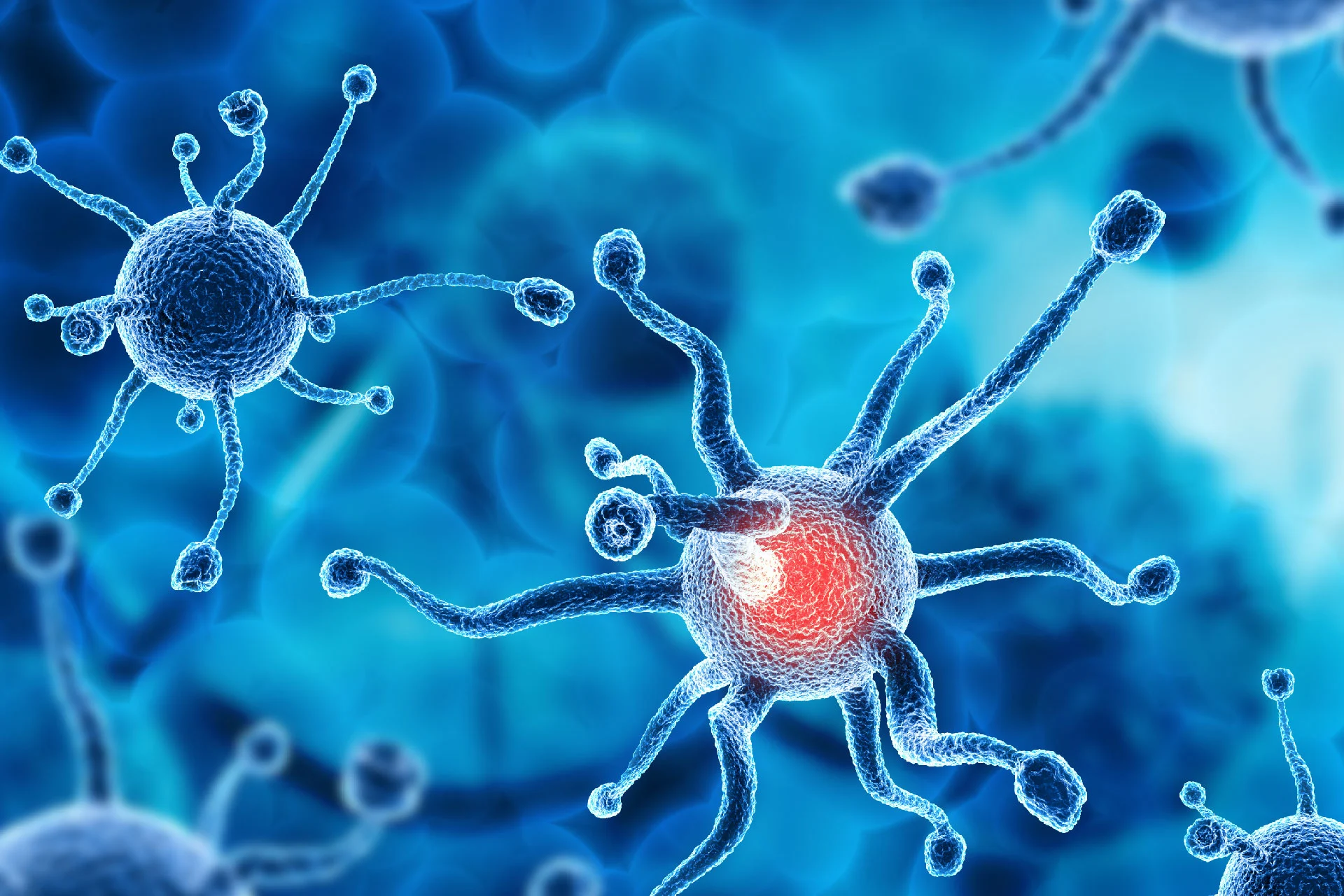Cancer | 6 min read
Early Signs and Symptoms of Brain Tumor
Medically reviewed by
Table of Content
Synopsis
Did you know that brain tumor symptoms can vary as per the location of its growth or the pressure created by it? Discover all you need to know to watch out for this condition.
Key Takeaways
- More than 150 types of brain tumors have been found
- All brain tumors are not cancerous growths
- Common brain tumor symptoms include headaches and seizures
What is a Brain Tumor?
A brain tumor is an abnormal growth of cells in the brain or a place near it. Locations near the brain where brain tumors may develop apart from the brain include the pineal gland, the pituitary gland, nerves, and membranes covering the surface of the brain. Brain tumor symptoms depend on the location of the abnormal growth as well as the increase in pressure.
Though above 150 types of brain tumors have been identified, there are two major types of brain tumors - primary and secondary [1]. Primary brain tumors are the ones that spread on the brain only. Secondary brain tumors, also known as metastatic brain tumors, grow beyond the brain and spread to other parts of the body. Thus, symptoms of brain tumor can differ in the case of both.
Remember that all brain tumors are not cancerous. Non-cancerous brain tumors are called benign brain tumors, and they take time to grow. Therefore, these brain tumors are comparatively less dangerous. On the other hand, cancerous or malignant brain tumors grow quickly, and they cause severe damage to the brain tissue.
The size of brain tumors also varies from extremely small to extremely large. In the case of early symptoms, diagnosing brain tumors at a latent stage becomes easier. However, if a brain tumor starts developing in a less responsive part of the brain, you may not get immediate signs of a brain tumor. In such cases, a brain tumor may be diagnosed when the tumor has grown quite big and affects other parts of the brain.
The treatment of a brain tumor depends on its type, location, and size. Doctors usually recommend radiation therapy or surgery for the treatment of brain tumors.
Additional Read: Types of Brain Stroke
Risk Factors
Brain tumors can happen to anyone. However, certain risk factors increase the chance of getting a brain tumor. Here's a look at them:- Age: Brain tumors are more common among older people. However, certain types of brain tumors can affect children the most
- Radiation: Individuals exposed to powerful radiation are more likely to have brain tumors than those without such exposure. This powerful radiation is known as ionizing radiation, and it has the power to inflict changes in the DNAs of the body cells. These DNA changes are crucial reasons for brain tumors and cancers. Individuals may be exposed to Ionizing radiation from radiation therapy for cancer treatment and radiation inflicted by atomic bombs
Remember that low-level radiation to which we get frequently exposed doesn't cause brain tumors or brain cancers. So, you will not likely get brain tumor from the radiation energy emitted by radio waves and mobile phones. However, more research is on to get detailed insights into this.
- Genetic link: Some DNA changes can have a hereditary link and run in families. Common examples of this are DNA mutations that lead to the following conditions:
- Neurofibromatosis 1 and 2
- Gorlin syndrome
- Cowden syndrome
- Familial adenomatous polyposis
- Von Hippel-Lindau disease
- Li-Freemen syndrome
- Lynch syndrome
- Tuberous sclerosis
Symptoms
Brain tumor early symptoms vary depending on the location of the tumor. A few general symptoms are as follows:
- Seizures
- Personality changes
- Chronic headaches
- Mood swings
- Vision troubles
Where Are Brain Tumors Usually Located
Brain tumor warning signs may develop in any part of our brain. Remember that our brain has two major parts - the cerebrum and the cerebellum. The cerebrum has the following four areas, and brain tumors may develop in any of these:
- Frontal lobe
- Temporal lobe
- Parietal lobe
- Occipital lobe
Apart from these, our brain has four other important areas, which are:
- Spinal cord
- Brainstem
- Pineal gland
- Pituitary gland
Temporal Lobe Brain Tumor Symptoms
This part of the brain is used to process sounds and store memories. A tumor here can lead to the following symptoms:
- Speech and hearing difficulty
- Auditory hallucination; hearing multiple voices inside your head
- Short-term memory loss
Frontal Lobe Brain Cancer Symptoms
The frontal lobe is the area of your brain responsible for walking and other movements and controlling your personality. Here are brain tumor symptoms that malignant growths in this region may cause:
- Unusual personality changes
- Loss of smell
- Trouble walking
- One side of the body gets weak
- Speech and vision issues
Parietal Lobe Brain Tumor
This area of your brain helps you remember objects by storing memories about the same. A tumor here may lead to the following symptoms:
- Trouble reading and writing
- Loss of senses in a certain part of the body
- Facing challenges in speaking and understanding speeches
This part of your brain is responsible for your vision. If a tumor develops in this area, it may lead to the following:
- Trouble recognizing the size and color of objects
- Vision difficulty
Cerebellum Brain Tumor Symptoms
Cerebellum is the controller of our posture and balance. So, abnormal growth of cells in this area may lead to the following:
- Balance and coordination issues
- Random eye movements, such as flickering
- Sickness
- Dizziness
Brainstem Tumor Symptoms
Brainstem is a crucial part of your brain that regulates breathing. A tumor here may cause:
- Trouble swallowing and making conversations
- Double vision
- Shakiness and trouble walking
Spinal Cord Brain Tumor Symptoms
The spinal cord is an extended bundle of nerves that links the brain with the lower parts of the back. A tumor in the spinal cord may lead to the following:
- Losing control of bowel and bladder movements
- Weakness or numbness in different body parts
- Severe pain
Pituitary Gland Brain Cancer Symptoms
The pituitary gland is responsible for secreting hormones that boost different body functions. Here’s what a tumor in the pituitary gland can lead to:
- Mood swings
- Hypertension
- Rapid weight gain
- Infertility
- Milk leaking from your breast (when you are not breastfeeding)
- Diabetes
Pineal Gland Tumor Symptoms
This gland produces a hormone named melatonin. A brain tumor in this area may lead to:
- Shaky walking
- Double vision
- Fatigue
- Weakness
- Headache
Additional Read: Types of Cancer Treatment
Brain Tumor Symptoms Due to Increased Pressure
Apart from the symptoms caused by the position of a brain tumor, excess pressure created by a growing tumor on your skull may lead to the following symptoms:
- Seizures
- Headaches
- Loss of consciousness
- Weakness
- Changes in personality
- Vision problems
Now that you know about major brain tumor symptoms, it becomes easier to identify them and consult a doctor. Remember, all symptoms are not brain cancer symptoms, so there is no need to worry. For a quick oncologist consultation, you can book an online appointment on Bajaj Finserv Health. The cancer specialist registered with the platform will resolve all your doubts and recommend suitable diagnostic tests or treatment procedures if the condition has already been diagnosed. Check your health parameters regularly to keep brain tumor and symptoms at bay!
References
- https://www.aans.org/en/Patients/Neurosurgical-Conditions-and-Treatments/Brain-Tumors
Disclaimer
Please note that this article is solely meant for informational purposes and Bajaj Finserv Health Limited (“BFHL”) does not shoulder any responsibility of the views/advice/information expressed/given by the writer/reviewer/originator. This article should not be considered as a substitute for any medical advice, diagnosis or treatment. Always consult with your trusted physician/qualified healthcare professional to evaluate your medical condition. The above article has been reviewed by a qualified doctor and BFHL is not responsible for any damages for any information or services provided by any third party.






